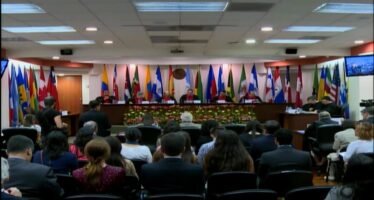Cote d’Ivoire vote count underway
![]()
Possible run-off vote expected in what looks to be a very tight presidential poll in West African nation.
Early results in Cote d’Ivoire’s presidential election show a very tight race between Laurent Gbagbo, the incumbent president and the West African nation’s main opposition leader. Around 2.2 million votes have been counted of an estimated 4.2 million cast, and Gbagbo and Alassane Ouattara, a former prime minister, each secured 35 per cent of the votes on Wednesday.Henri Konan Bedie, a former president, was in third place with about 27 per cent.If no candidate wins a simple majority, the top two candidates will face a run-off vote in a second round on November 28.The West African nation held its first presidential election on Sunday since civil war erupted in 2002 and split the world’s leading cocoa producer in half.Hopes are pinned on the repeatedly delayed poll to reunite the divided country and restore stability after more than a decade of chaos and tension.But with former rebels still armed in the north, powerful militias running free in the west and armed groups on all sides who do not want to lose, many also fear the political contest could unleash a new era of chaos.Uncertainty and a two-day delay in releasing results have fuelled new fears of possible unrest.On Tuesday, many businesses and restaurants in the main city, Abidjan, shut down or sent workers home early.General Phillipe Mangou, the head of the armed forces urged residents to return to work as normal and stay calm.Results delayedEarlier on Tuesday, Cristian Preda, head of the European Union’s observer mission, criticised the country’s electoral commission for delaying the release of results, saying the failure to do so was fuelling tensions in the country.However, election officials have said logistical problems and heavy rains are to blame for delayingresults for two days.Yves Tadet, an electoral commission official, told the Associated Press that a final tally was expected on Wednesday.Preda said the EU had detected no fraud in Sunday’s poll, but he raised questions about transparency in ballot counting, accusing the electoral commission of barring 14 EU monitors from areas where ballots were being counted in several parts of the country.Those include the commission’s headquarters in Abidjan, where national results are beingreleased.”It’s an act that we deplore, and there is no rational explanation for it,” Preda said.”Everything must be transparent.”Preda also said that on Tuesday morning, some observers were still being refused entry in some counting centres because authorities had told them that “there is nothing to see”.Refused entryTadet said that although monitors could observe counting at polling stations and regional centres across the country, they were not allowed to observe the final tabulation of results at the independent electoral commission headquarters.More than a quarter of Cote d’Ivoire’s 20 million people are foreign immigrants who came to work on cocoa and coffee plantations.Differentiating them from native Ivorians with roots in neighbouring countries has been profoundly contentious.Gbagbo’s party believes countless foreigners have falsified documents to vote in an opposition – and rebel-driven bid – to skew the poll, while opposition leaders contend the process has merely helped cement legitimate rights to citizenship.Despite perceived imperfections, though, all parties have accepted the list and the UN – which has around 9,000 peacekeepers in the country – has deemed it “credible”.Last month, Gbagbo officially validated the final 5.7-million-person voter roll, and only in the weeks since has the government begun handing out millions of new identity cards.An estimated $400m has been spent identifying voters and issuing state-of-the-art biometric IDs, prompting some observers to call it the most expensive election in the world.
Related Articles
Inusitado comunicado de Colombia sobre las demandas de Nicaragua ante la CIJ
![]()
En un comunicado de su Ministerio de Relaciones Exteriores difundido este 16 de noviembre, Colombia anunció que “contrademandó” a Nicaragua
Occupy phase two: What’s next for New York?
![]()
Nikolas Kozloff Nikolas Kozloff is the author of Revolution! South America and the Rise of the New Left (Palgrave-Macmillan, 2008).
UK-based Taliban spend months fighting Nato forces in Afghanistan
![]()
Taliban fighter reveals he lives for most of year in London and heads to Afghanistan for combat Ghaith Abdul-Ahad and



